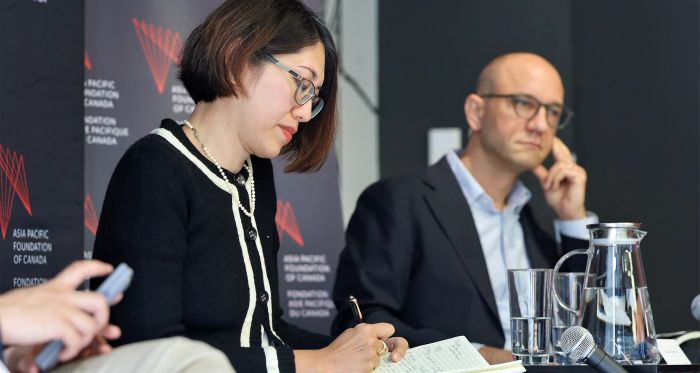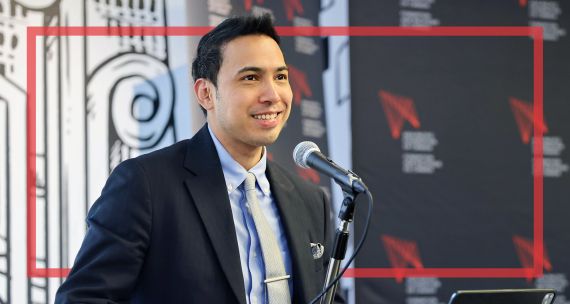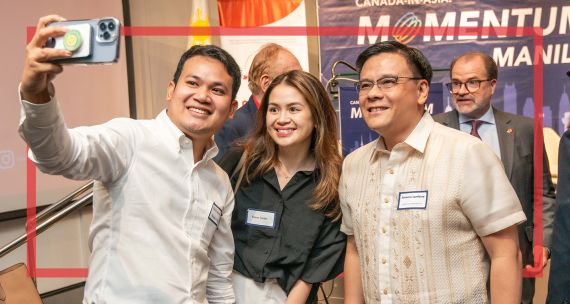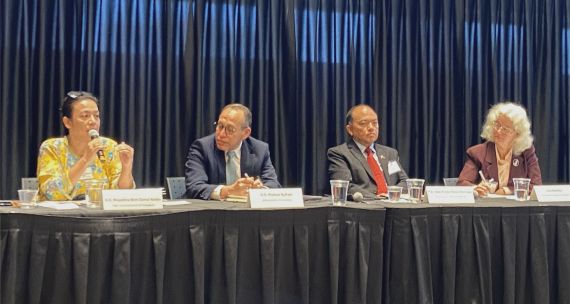On September 15, 2025, the Asia Pacific Foundation of Canada (APF Canada) hosted a panel discussion on “Canada–ASEAN Co-operation at a Turning Point: Priorities for the Malaysian & Philippine Chair Years” at its Vancouver office. The event explored Canada’s engagement with the Association of Southeast Asian Nations (ASEAN) — a 10-member bloc, soon expanding to 11 with the addition of Timor-Leste — and brought together three leading academics to examine the opportunities, challenges, and potential areas of co-operation shaping the future of Canada–ASEAN relations, with a particular focus on Malaysia and the Philippines, the current and incoming ASEAN chairs.
Collectively representing the world’s third-largest population and fifth-largest economy, ASEAN is central to Canada’s efforts to diversify its trade and investment portfolio. In 2023, Canada and ASEAN elevated their ties to a Strategic Partnership, with Ottawa now working toward concluding an ASEAN-Canada Free Trade Agreement (ACAFTA) and a revised Five-Year Action Plan by the end of 2025.
A growing global shift towards economic protectionism and nationalism and the need for Ottawa to diversify its trade and investment portfolio beyond the U.S. makes it crucial for Canada to broaden its engagement with ASEAN. This newfound urgency is evolving against a complex geopolitical backdrop, with Southeast Asia at the forefront of intensifying U.S.-China strategic competition and the site of several flashpoints.
This report summarizes the highlights from the discussion.
Speakers:
- Richard Heydarian, Senior Lecturer in International Affairs at the University of the Philippines Asian Center and APF Canada Indo-Pacific Visiting Scholar.
- Dr. Tricia Yeoh, Associate Professor of Practice at the University of Nottingham Malaysia and Senior Fellow at APF Canada.
- Dr. Kai Ostwald, Associate Professor in UBC’s School of Public Policy & Global Affairs and the Department of Political Science, and Senior Fellow at APF Canada.
- Vina Nadjibulla, Vice-President of Research & Strategy, APF Canada (Moderator).
Strengthening Canada–ASEAN Ties: Navigating Challenges and Opportunities
With the launch of Canada’s Indo-Pacific Strategy (IPS) in 2022, Canada has sought to significantly expand and deepen its engagement with Southeast Asia. Vina Nadjibulla highlighted that Southeast Asia offers vast market potential and emerging opportunities in the digital economy, including advanced technologies such as artificial intelligence and quantum computing, as well as security partnerships.
ASEAN now stands as Canada’s fourth-largest trading partner, with bilateral merchandise trade reaching C$42.3 billion in 2024. Beyond trade, Canada has significantly expanded its on-the-ground presence across the region, opening Export Development offices in Indonesia, Thailand, and Vietnam; an Agriculture and Food Security Office in the Philippines; and a Development Finance Institute in Singapore since 2023. Ministerial engagement has also deepened, including inaugural visits by Canada’s prime minister and foreign affairs minister to yearly ASEAN summits.
Yet as Ottawa works to finalize the long-awaited ASEAN-Canada Free Trade Agreement and update its ASEAN action plan, Canada must confront its reputation as a “fair-weather friend,” still lacking the consistency and reliability valued by Southeast Asian partners. As highlighted by the participants, key challenges include moving beyond trade to demonstrate credible co-operation in areas that align with ASEAN priorities and sustaining support for ASEAN centrality and strategic neutrality amid rising geopolitical tensions and an escalating U.S.–China rivalry.
At the same time, Canada is not without its advantages. The country continues to be regarded as a strong supporter of democratic governance and liberal norms, demonstrated by its constructive role in supporting Myanmar’s democratization efforts over the last decade. Canada also hosts one of the fastest-growing Southeast Asian diasporas outside the region, further strengthening people-to-people connections and deepening cultural ties.
Moreover, amid the “leadership vacuum” created by the second administration of U.S. President Donald Trump and his transactional foreign policy, ASEAN states are actively seeking dependable, like-minded partners, noted Dr. Kai Ostwald. This shifting landscape presents an opportunity for Canada to play a more meaningful role in shaping regional co-operation.
These opportunities will become even more relevant as ASEAN transitions its chairmanship to the Philippines in 2026. As Richard Heydarian highlighted, Manila is expected to place maritime security — particularly the South China Sea disputes — at the top of its agenda.
Canada’s Next Five-Year Action Plan
As Canada prepares to revise its Five-Year Action Plan for ASEAN (2021–2025), all panelists agreed that success will require moving beyond trade agreements.
Heydarian urged Canada to pursue “niche interventions” capable of delivering significant impact at modest cost. He highlighted the dark vessel detection program, which helps track ships engaged in illegal, unreported, and unregulated fishing. Building on this point, Ostwald pointed to Canada’s expertise in addressing non-traditional security challenges — such as artificial intelligence, cybersecurity, and transnational crime — where Canadian technical assistance could make a meaningful difference.
Dr. Tricia Yeoh referred to the region’s alarming rise in cybercrime, noting that many ASEAN member states lack effective policies and regulatory frameworks to keep pace with this fast-evolving threat. Canada, she suggested, is well-positioned to help countries develop and implement stronger policies, regulations, and capacity-building initiatives. Nadjibulla added that Canada–ASEAN co-operation in this area is already growing, citing the launch of the BlackBerry Cybersecurity Center of Excellence in Malaysia as an early success story.
Beyond these tangible areas of co-operation, Yeoh stressed the importance of people-to-people connections, cultural exchanges, and support for liberal democratic norms — areas where Canada can help fill a widening gap left by Western partners who have increasingly prioritized security and defence.
With the suspension of USAID programs and a more inward-looking U.S. foreign policy, Ostwald noted that Canada has a unique opportunity to position itself as a “North American alternative,” particularly in higher education, development assistance, and support for governance and democratization in Myanmar and beyond.
The Path Forward
Despite ongoing turbulence, ASEAN states continue to reaffirm their commitment to a rules-based international order. Ostwald acknowledged that Canada’s regional engagement has grown since the launch of the IPS but cautioned that this must be matched with a sustained and visible commitment.
At the same time, Canada’s engagement remains trade-heavy, as Yeoh observed, underscoring the need for Ottawa to demonstrate that it can be more than a trade partner and differentiate itself from competitors such as China, India, and Japan.
Heydarian further stressed the importance of credibility, noting that some Southeast Asian states — such as Indonesia and Malaysia — have criticized the selective application of international law by Western countries, referring to the inconsistent responses to conflicts such as Russia’s invasion of Ukraine versus the war in Gaza.
All participants agreed that ensuring the equal application of international law and the rules-based international order will be vital to deepening trust in the region.
• Edited by Erin Williams, Director, Programs, and Ted Fraser, Senior Editor, APF Canada





